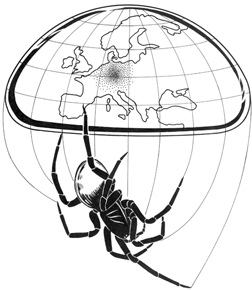Spinnenzönosen als Indikatoren von Entwicklungsschritten in einer Bergbaufolgelandschaft
Spider communities as indicators of the development (succession) of afforested coal mining sites
spider communities; succession; rehabilitation; coal mining; cluster analysis; afforestation
Abstract
On the basis of a space-for-time-substitution the succession of the spider coenosis of a Lusatian lignite mining area (pine afforestation) was investigated. Spiders were chosen because of their high abundance in both species and individuals and as representatives of a high tropic level. By comparing pine afforestations of different ages which additionally are located far away from each other we could detect a typical succession pattern in the spider coenosis. The pioneer Oedothorax apicatus (Linyphiidae) is characteristic of the initial state. Ten years after afforestation this species has disappeared and the locality shows a mixed population of spiders including species which prefer open habitats as well as species occurring in forests. After 30 years the typical species community of open, dry pine forests has established.
Nachträge zum 'Katalog der schweizerischen Spinnen'. 2. Neunachweise von 1993 bis 1999
Supplement to 'Katalog der schweizerischen Spinnen'. 2. New records from 1993 to 1999
Spiders; faunistics; first records; Switzerland
Abstract
Since the first supplement in 1993 38 species are recorded as new to Switzerland. 14 species are recorded here for the first time for Switzerland: Enoplognatha oelandica (Thorell, 1875); Theridion hemerobium Simon, 1914; Diplocephalus crassilobus (Simon, 1884); Diplocephalus pavesii Pesarini, 1996; Linyphia tenuipalpis Simon, 1884; Porrhomma cambridgei merrett, 1994; Porrhomma rosenhaueri (L.Koch, 1872); Pachygnatha terilis Thaler,1991; Hahnia candida Simon, 1975; Cryptodrassus hungaricus (Balogh, 1935); Zelotes devotus Grimm, 1982; Zelotes hermani (Chyzer, 1897); Zelotes tenuis (L.Koch, 1866); Tmarus stellio Simon, 1875. 24 species were published in other papers and are listed here only to complete the catalogue: Episinus maculipes Cavanna, 1876; Robertus kuehnae Bauchhenss & Uhlenhaut, 1993; Centromerus capucinus (Simon, 1884); Diplocephalus dentatus Tullgren, 1955; Lepthyphantes arenicola Denis, 1964; Lepthyphantes insignis (O.P.-Cambridge, 1913); Lessertia dentichelis (Simon, 1884); Maro lepidus Casemir, 1961; Prinerigone vagans (Audouin, 1826); Pseudomaro aenigmaticus Denis, 1966; Silometopus bonessi Casemir, 1970; Acantholycosa norvegica (Thorell, 1872); Acantholycosa rupicola (Dufour, 1820); Pardosa alacris (C.L.Koch, 1933); Pardosa baehrorum Kronestedt, 1999; Pardosa saltans Töpfer-Hofmann im Druck; Altella biuncata (Miller, 1949); Agroeca inopina O.P.-Cambridge, 1886; Clubiona pseudoneglecta Wunderlich, 1994; Zodarion italicum (Canestrini, 1868); Synaphosus sauvage Ovtsharenko, Levy & Platnick, 1994; Zora parallela Simon, 1878; Thanatus atratus Simon, 1875; Ozyptila pullata (Thorell, 1875). 4 species have to be deleted from the catalogue: Diplocephalus foraminifer (O.P.-Cambridge, 1875); Diplocephalus aff. procer (Simon, 1884) sensu Thaler (1972); Acantholycosa pyrenaea (Simon, 1876); Zodarion gallicum (Simon, 1873). The actual number of known species in Switzerland is 926.
Pseudeuophrys browningi (Millidge & Locket, 1955) (Araneae, Salticidae) neu für Deutschland und Enoplognatha caricis (Fickert, 1876) (Araneae, Theridiidae) neu für Brandenburg
Pseudeuophrys browningi (Millidge & Locket, 1955) (Araneae: Salticidae) new to Germany and Enoplognatha caricis (FICKERT, 1876) (Araneae: Theridiidae) new to Brandenburg (Germany)
first record
Abstract
Pseudeuophrys browningi (Millidge & Locket, 1955) (Araneae: Salticidae) new to Germany and Enoplognatha caricis (FICKERT, 1876) (Araneae: Theridiidae) new to Brandenburg (Germany)
Erstnachweis von Trichoncus auritus (L. Koch, 1869) (Araneae, Linyphiidae, Erigonidae) für Deutschland
First record of Trichoncus auritus (L. Koch, 1869) (Araneae, Linyphiidae, Erigoninae) from Germany
Abstract
First record of Trichoncus auritus (L. Koch, 1869) (Araneae, Linyphiidae, Erigoninae) from Germany
Spinnen-Neunachweise für Deutschland aus den Bayerischen Alpen (Araneae: Linyphiidae, Hahniidae, Gnaphosidae, Salticidae)
First records of five spiders from alpine habitats in Germany (Araneae: Linyphiidae, Hahniidae, Gnaphosidae, Salticidae)
Araneae; first records to Germany; Bavarian Alps; zoogeography
Abstract
The arachnofaunistic exploration of the German Alps is still in process. Recent investigations in supalpine and alpine habitats of Bavaria yielded 13 species new to Germany. For 5 taxa the collecting sites are reported, together with comments on general distribution and ecology. Cryphoeca lichenum nigerrima is a locally-endemic relict, which probably has survived glaciation on the nunatak system. Its distribution area is restricted to few mountain-ranges in the Northern Calcareous Alps, comprisin less than 2500 qkm. Two species, Erigone cristatopalpus und Talavera monticola, are endemic to the Alps and adjoining mountains. Micaria aenea shows a boeromontane disjunction. Heliophanus lineiventris is widely distributed in the southern Palearctic.
Sparassidae – the valid scientific name for the huntsman spiders (Arachnida: Araneae)
Sparassidae – der gültige wissenschaftliche Name für die Riesenkrabbenspinnen (Arachnida: Araneae)
Sparassidae; Sparassus; Micrommata; family name; nomenclature
Abstract
The family name Sparassidae is recognized as available and valid according to the rules of the International Code for Zoological Nomenclature. Synonymies, diagnoses and descriptions are given for the family, subfamily, type genus and type species. The type species of Sparassus is assigned. Sparassus is synonymised with Micrommata.


